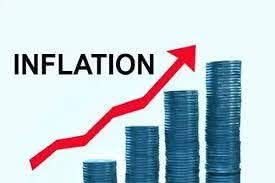Nigeria’s inflation rate jumps to 34.80% in December from 34.60%— NBS Report
The National Bureau of Statistics (NBS) says Nigeria’s headline inflation rate increased to 34.80 per cent in December 2024.
The NBS disclosed this in its Consumer Price Index (CPI) and Inflation Report for December 2024, which was released in Abuja on Wednesday, reports News Agency of Nigeria (NAN).
President Tinubu has boasted that he will bring down the inflation rate to 15% in this year.
According to the report, the figure is 0.20 per cent higher compared to the 34.60 per cent recorded in November 2024.
The NBS said that the slight increase in the headline inflation on a month-on-month basis was due to increase in demand for goods and services during the festive season in December.
It said that on a year-on-year basis, the headline inflation rate in December 2024 was 5.87 per cent higher than the rate recorded in December 2023 at 28.92 per cent.
The report said on a month-on-month basis, the headline inflation rate in December 2024 was 2.44 per cent, which was 0.20 per cent lower than the rate recorded in November 2024 at
2.64 per cent.
“This means that in December 2024, the rate of increase in the average price level was slightly lower than the rate of increase in the average price level in November 2024,” it said.
The report noted the increase in the headline index for December 2024 on a year-on-year and month-on-month basis.
It attributed the development to the increase in some items in the basket of goods and services at the divisional level.
It said that these increases were observed in food and non-alcoholic beverages, housing, water, electricity, gas, and other fuel, clothing and footwear, transport and furnishings, household equipment and maintenance.
It listed others to include education, health, and miscellaneous goods and services restaurants and hotels, alcoholic beverages, tobacco and kola, recreation and culture, and communication.
The NBS report said that the percentage change in the average CPI for the 12 months ending December 2024 over the average CPI for the previous 12 months was 33.24 per cent.
“This indicates an 8.58 per cent increase compared to 24.66 per cent recorded in December 2023,” it said.
The report said the food inflation rate in December 2024 increased to 39.84 per cent on a year-on-year basis.
According to the report, that was 5.91 per cent higher compared to the rate recorded in December 2023 at 33.93 per cent.
“The rise in food inflation on a year-on-year basis is caused by increases in prices of yam, water yam, sweet potato, guinea com, maize grains, and rice.
“Others are beer, pinto, dried fish (sardine), dried catfish, among others,it said.
It said on a month-on-month basis, the food inflation rate in December was 2.66 per cent; indicating a 0.32 per cent decrease compared to2.98 per cent that was recorded in November 2024.
“The decline in food inflation on a month-on-month basis can be attributed to the rate of decrease in the average prices of local beer, pinto, fruit juice in tin, and malt drinks.
“Others are rice, millet, maize flour, water yam, Irish potatoes, cocoyam, among others,” it said.
The report said that all items, excluding farm produce and energy. or core inflation, which excludes the prices of volatile agricultural produce and energy, stood at 29.28 per cent in December on a year-on-year basis.
“This increased by 6.21 per cent compared to 23.06 per cent recorded in December 2023.
“The exclusion of the PMS is due to the deregulation of the commodity by removal of subsidy,” it said.
It said that the highest increases were recorded in prices of taxi journey per drop, bus journey intercity, and journey by motorcycle.
“Others are meal at a local restaurant, hair cut service, women’s hairdressing, women’s hair brush, women’s handbag, travelling bags, suitcases among others,”the report said.
The NBS said on a month-on-month basis, the core inflation rate was 2.24 per cent in December 2024.
“This indicates a 0.41 per cent increase
compared to what was recorded in November 2024 at 1.83 per cent.
“The average 12-month annual inflation rate was 27.15 per cent for the 12 months ending December 2024; this was 6.39 per cent points higher than the 20.76 per cent recorded in December 2023.”
The report said on a year-on-year basis in December 2024, the urban inflation rate was 37.29 per cent. which was 6.30 per cent higher compared to the 31.00 per cent recorded in December 2023.
“On a month-on-month basis, the urban inflation rate was 2.56 per cent, which decreased by 0.21 per cent compared to November 2024 at 2.77 per cent.”
The report said on a year-on-year basis in December, the rural inflation rate was 32.47 per cent, which was 5.37 per cent higher compared to the 27.10 per cent recorded in December 2023.
“On a month-on-month basis, the rural inflation rate was 2.32 per cent, which decreased by 0.19 per cent compared to November 2024 at 2.51 per cent.”
On states profile analysis, the report showed that in December, all items’ inflation rate on a year-on-year basis was highest in Bauchi at 44.06 per cent, followed by Sokoto at 42.43 per cent, and Kebbi at 41.47 per cent.
It, however, said the slowest rise in headline inflation on a year-on-year basis was recorded in Katsina at 28.33 per cent, followed by Delta at 29.23 per cent, and Imo at 29.99 per cent.
The report, however, said in December 2024, all items inflation rate on a month-on-month basis was highest in Kogi at 5.40 per cent, followed by Cross River at 4.38 per cent, and Sokoto at 4.29 per cent.
“Yobe -1.82 per cent, followed by Kano at -0.57 per cent and Abuja at 0.02 per cent recorded the slowest rise in month-on-month inflation.”
The report said on a year-on-year basis, food inflation was highest in Sokoto at 57.47 per cent, followed by Zamfara at 46.39 per cent, and Edo at 46.32 per cent.
“Ogun at 34.24 per cent, followed by Rivers at 35.43 per cent and Kwara at 35.58 per cent recorded the slowest rise in food inflation on a year-on-year basis.”
The report, however, said on a month-on-month basis, food inflation was highest in Kogi at 6.53 per cent, followed by Sokoto at 6.21 per cent, and Cross River at 5.90 per cent.
“Yobe at -3.21 per cent, followed by Kano at -1.29 per cent and Abuja at -0.79 per cent, recorded the slowest rise in inflation on a month-on-month basis.”





